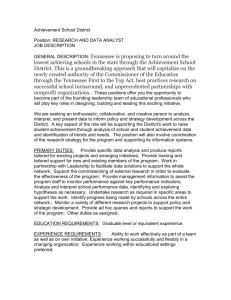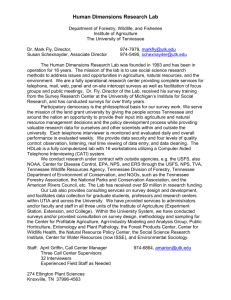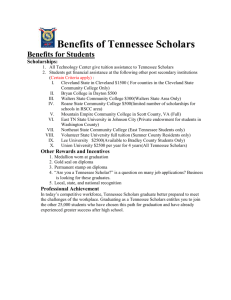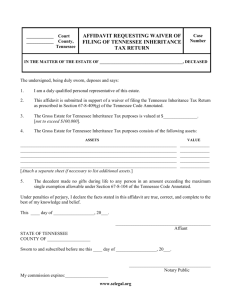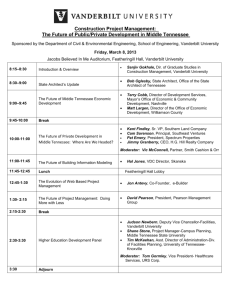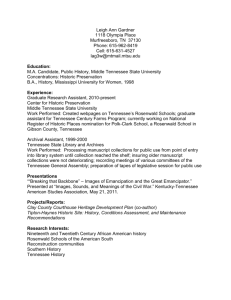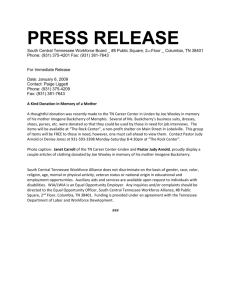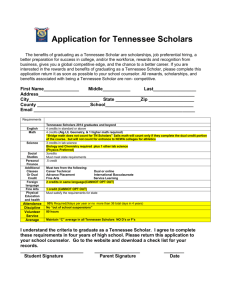Syllabus - East Tennessee State University
advertisement
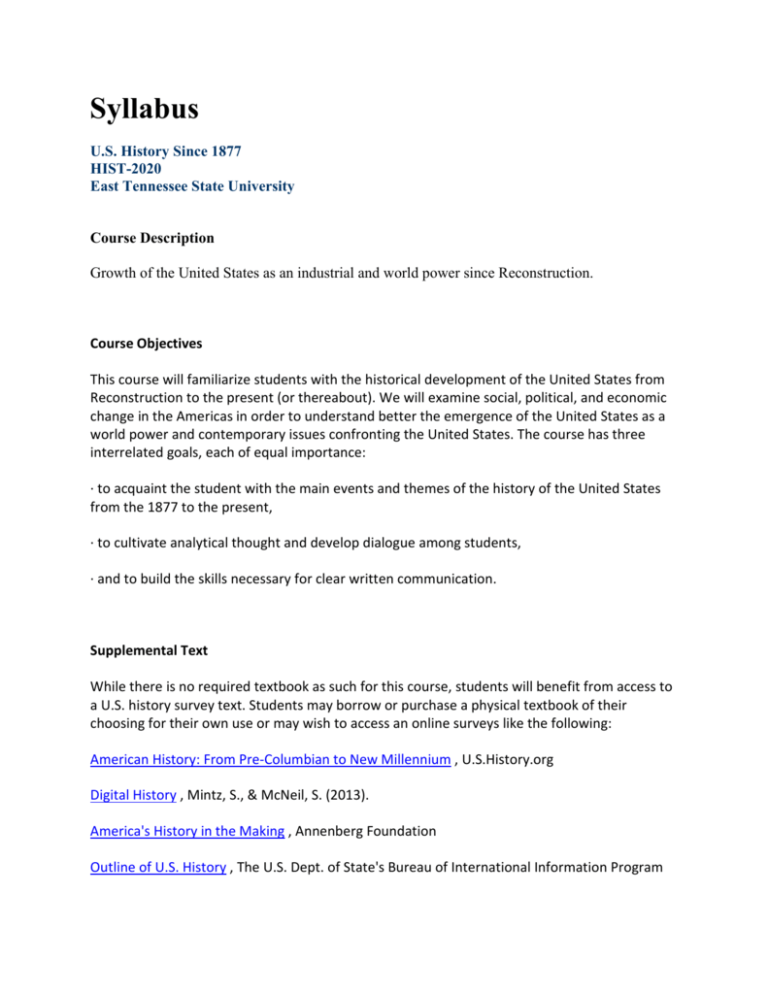
Syllabus U.S. History Since 1877 HIST-2020 East Tennessee State University Course Description Growth of the United States as an industrial and world power since Reconstruction. Course Objectives This course will familiarize students with the historical development of the United States from Reconstruction to the present (or thereabout). We will examine social, political, and economic change in the Americas in order to understand better the emergence of the United States as a world power and contemporary issues confronting the United States. The course has three interrelated goals, each of equal importance: · to acquaint the student with the main events and themes of the history of the United States from the 1877 to the present, · to cultivate analytical thought and develop dialogue among students, · and to build the skills necessary for clear written communication. Supplemental Text While there is no required textbook as such for this course, students will benefit from access to a U.S. history survey text. Students may borrow or purchase a physical textbook of their choosing for their own use or may wish to access an online surveys like the following: American History: From Pre-Columbian to New Millennium , U.S.History.org Digital History , Mintz, S., & McNeil, S. (2013). America's History in the Making , Annenberg Foundation Outline of U.S. History , The U.S. Dept. of State's Bureau of International Information Program U. S. History, (Digital) HippoCampus.org Mastery Tests Vocabulary, the words we use when writing or speaking, function as the building blocks of our ideas like bricks in a wall. Imagine trying to explain to someone why one product at a grocery store is better than another product. Now imagine making the case without using words or even symbolically suggestive gestures. The effort might make for an interesting game of charades but would be unbearably frustrating like trying to build a brick wall without bricks. The facts, dates, events, people, and movements of history make up what we may call the vocabulary of history. They are the words, the basic units, that historians assemble in particular patterns to convey ideas and make arguments. Before you can communicate effectively historically, you must be able to speak the language. More than merely assessments, the Mastery Tests are mechanisms for developing and improving students' historical vocabulary so that they can build and assess historical arguments. For each unit of the course, students will complete a multiple choice Mastery Test and achieve a minimum sore of '80' before being allowed to advance to the Discussion Forum (see below). While the Mastery Tests are assessments, in that they allow students to assess their command of the basic factual material covered in this course, they function primarily as tools for comprehension, study, and review. Students may take the Mastery Test an unlimited number of times within the allotted testing period until they have achieved the desired score; however, the test questions, twenty-five per test, will be drawn from a question database and randomized each time that a Mastery Test is attempted. Incorrect and correct answers will be noted so that students may improve their command of the material covered, but students should not expect to see the same twenty-five questions each time. Discussion Forums Discussion Question Overview An essential objective of this class focuses on building good critical thinking and communication skills; to that end, students will participate in online discussions through discussion forums. There will be one discussion for each unit of the course (there are four units and thus four discussions). Each discussion will consist of two elements. To complete the first element, students must post a well-constructed, thoughtful answer of no more than 500 words to one of a selection of questions posed by the instructor. To complete the second element, students must engage in a process of peer review by offering follow-up posts to two answers posted by other students. In these follow-up posts, or responses, students should seek to expand on the arguments made in the original post or respond to points raised in other follow-up posts. Please read carefully the directions found at the beginning of each discussion activity and pay close attention to the due dates. Because each discussion will entail the posting of both an original answer and then two subsequent follow-up posts, there will be two deadlines for each discussion activity: one for the initial response to the discussion questions and one for the follow-up posts to classmates. In other words, after a student has offered his or her own answer to the question asked, s/he will be required to respond to at least two classmates’ posts before the forum is locked by the indicated date. Discussion boards will be locked after the due date for follow-up posts, meaning that students may still read the discussion board posts, but no new posts can be added. Once the discussion boards are locked they will not be re-opened. All posts should consist of insightful, intelligent comments. In order to communicate clearly, students should use proper English sentences rather than slang or texting abbreviations. Both in the original and the follow-up posts, students should make every effort to support assertions (opinions) with fact and evidence (elements of vocabulary) by drawing pertinent examples and information from course lectures, websites, videos, and/or online primary documents (documents of the time). Students may wish to look at the sample rubric (list of things to look for) for discussion post evaluation available in the online Course Introduction folder on the course website. Discussion Netiquette Discussion board netiquette can be summarized by three simple precepts: 1. Remember that there is a human being on the other end of your communication. 2. Treat that human being with respect. 3. Do not transmit any messages that you would be unwilling to communicate face to face. To assist in meeting these precepts, familiarize yourself with the following : · Be careful what you write about others. It is fine to disagree with a post, but never make it personal. Always offer constructive, not hurtful, criticism. · Avoid insulting and inflammatory statements to other member of the discussion group. Keep away from sarcasm and slang. · Never use derogatory comments, including those regarding race, age, gender, sexual orientation, religion, physical or mental health issues. · Generally speaking, avoid putting words into full capitals. Online, ALL CAPS is considered SHOUTING. · Do not post irrelevant, unrelated messages to the discussion boards. · Read existing follow-up postings and don’t repeat what has already been said. · Respect other people’s intellectual property. Don’t post, display, or otherwise provide access to materials belonging to others, and cite references as appropriate. · Temper online expressions of hostility. Swear words are always unacceptable. · Express yourself using proper spelling, capitalization, grammar, usage, and punctuation. · Review your messages before sending them. Remove easily misinterpreted language and proofread for typos. · The best rule of thumb for discussion board netiquette is “Think, before you post.” **Repeated failure to adhere to the netiquette guidelines or extreme instances of abuse WILL result in expulsion from discussion board activities and from the course at the discretion of the instructor.** Class Participation In order to do well in any course, students must participate in all aspects of the course and complete assignments in a timely manner. While this is an online course and students do not meet in a traditional classroom setting, the course still involves assignments and deadlines. Students should · expect to spend at least 8-10 hours a week working on class related activities – reading, watching lectures, and completing assignments, · visit the course website at least every other day in order to stay abreast of important information, · and submit work early so that, in the event of a problem, the work may still be submitted in advance of any deadline. The instructors for this course have created assignments for each unit of the course. Each unit will be open for approximately two weeks. Students may complete assignments at their own pace within the time parameters established for each assignment by the instructors. To keep up with these assignments and the due dates, students should consult the calendar at the end of this syllabus. NOTICE! Because this course is an online course and because the student has chosen to enroll in it, the student bears responsibility for ensuring that s/he has a reliable internet connection, appropriate software, and dependable hardware. A persistent problem with wi-fi, connectivity, software, or hardware will not be considered by the instructors to be a valid excuse for nullifying or changing deadlines, accepting late assignments, or opening closed assignments. The Great Disclaimer : The instructors reserve the right, with reasonable notice provided to students, to make any changes to the syllabus necessitated by unforeseen circumstances. Tom Lee, Ph.D. , Assistant Professor Department of History | East Tennessee State University Tom Lee graduated with a Bachelor of Arts degree from East Tennessee State University, received a Master of Arts degree from Wake Forest University, and received a doctoral degree from the University of Tennessee with a specialization in the history of the U. S. South. He has taught at the University of Tennessee Knoxville, Roane State Community College, Hiwassee College, and currently is an Associate Professor of History at East Tennessee State University. In addition to the U.S. history survey, the Tennessee history survey, and the department's historical methods course, he teaches courses on the South, Appalachia, agricultural history, urban history, and public history. From 2006-2012, he served as the public historian for the Tennessee's First Frontier Teaching American History Project and currently serves as acting secretary for the Society of Appalachian Historians. In 2005, the University of Tennessee Press published his book, The Tennessee-Virginia Tri-Cities: Urbanization in Appalachia, 1900-1950. He is currently working on articles and another book focused on the history of tobacco in Southern Appalachia. Melanie Storie, M.A. , Lecturer Department of History | East Tennessee State University A scholar and teacher of American History for more than twenty years, Melanie Storie is a graduate of East Tennessee State University. In 1994 she earned her Master of Arts degree in history and for the past ten years has had the pleasure of teaching for her alma mater. She developed some of the first online U.S. History courses for her department and continues to teach both online and face-to-face classes. In addition to teaching survey courses in U.S. History, she has also taught Tennessee History and Women’s History. While she enjoys researching, writing, and teaching about many historical topics, her main research interest centers on 19th century U.S. History with a special emphasis on the American Civil War. She is a member of several historical associations and has published articles in her field of study. Her forthcoming book focuses on a Tennessee Union cavalry regiment during the Civil War. Daryl Carter, Ph.D. , Assistant Professor Department of History | East Tennessee State University Dr. Daryl A. Carter is assistant professor of history and graduate coordinator at East Tennessee State University. He specializes in American political history since the New Deal. His current book projects include “President Clinton, African Americans, and The Politics of Race and Class” and “Liberalism in Winter.” Dr. Carter is also interim director for strategic planning and new initiatives in the Office of eLearning at ETSU. He and his family reside in Johnson City, Tennessee. Aaron Owens, M.A., History Office of e-Learning | East Tennessee State University Aaron Owens is a recent 2013 graduate of East Tennessee State University, where he completed a Masters of Art in history with a concentration in American history with minor in world history. Prior to entering the history graduate program, he began his educational career at Southwest Virginia Community College double majoring in Liberal Arts and General Studies. Aaron graduated in 2008 with honors while serving in the Foreign Language Club, SVCC Club Board, and Phi Theta Kappa. He also won several awards at Southwest including Who’s Who among Junior College Students and Outstanding Leadership. Aaron entered East Tennessee State University’s honors-in-discipline program in 2008, where he pursued a Bachelor of Arts in history. He graduated in 2010, upon completing an undergraduate thesis, “Early Supreme Court Cases and their Effect on the 1961 Freedom Rides.” In 2011, Aaron Owens returned to pursue a Masters of Arts. In the last two years he was published in Now & Then magazine, inducted into Phi Kappa Phi, served as Secretary/Treasurer of Phi Alpha Theta, and competed his Master’s thesis entitled, “The Price of a Woolworth’s Burger”: The Importance and Overshadowing of the Nashville Sit-ins. About East Tennessee State University East Tennessee State University, located in Johnson City, TN, pursues its mission through a studentcentered community of learning reflecting high standards and promoting a balance of liberal arts and professional preparation, continuous improvement, and based on core values where: PEOPLE come first, are treated with dignity and respect, and are encouraged to achieve their full potential; RELATIONSHIPS are built on honesty, integrity, and trust; DIVERSITY of people and thought is respected; EXCELLENCE is achieved through teamwork, leadership, creativity, and a strong work ethic; EFFICIENCY is achieved through wise use of human and financial resources; and COMMITMENT to intellectual achievement is embraced. To learn more about East Tennessee State University, visit www.etsu.edu
